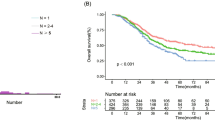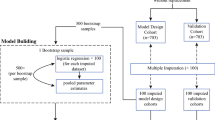Abstract
Introduction
Patients who recur in the first year after resection of colorectal liver metastases (CRLM) do poorly. The aim of our study was to predict treatment failure in patients undergoing upfront resection with a nomogram.
Methods
Data from patients resected between 1991 and 2019 were randomly split (70:30) into two cohorts. Treatment failure was defined as any recurrence or death within 12 months. A nomogram was constructed using multivariable logistic regression on the training cohort and validated using the testing cohort.
Results
Overall, 783 patients were included. Primary tumor characteristics included 50% left-sided: 75.2% T3/4 and 56.5% node-positive. The median disease-free interval was 10 months, median number of metastases was 1 (1–50), and with a median size of 3.6 cm (0.2–22); 222 (28.3%) patients recurred within 1 year. Recurrence was mostly extrahepatic with or without liver involvement (150/222, 67.6%). Curative-intent treatment was possible in 37.8% of these patients. Primary location, T-stage and node status, disease-free interval, and number and size of metastases were associated with treatment failure. The area under the curve from the validation of the model was 0.6 (95% confidence interval 0.52–0.68). Patients with a high-risk of treatment failure (≥40%) had a worse survival from the landmark time of 12 months from surgery compared with those with low-risk (2-years: 82% vs. 70%; p = 0.0002).
Conclusions
Primary location, T stage, node status, disease-free interval, and number and size of metastases are associated with treatment failure. The survival of patients with a probability of treatment failure ≥40% is unfavorable. Future trials investigating the role of neoadjuvant therapy in these high-risk patients are warranted.


Similar content being viewed by others
References
Siegel RL, Miller KD, Jemal A. Cancer statistics, 2020. CA Cancer J Clin. 2020;70(1):7–30.
D’Angelica M, Kornprat P, Gonen M, et al. Effect on outcome of recurrence patterns after hepatectomy for colorectal metastases. Ann Surg Oncol. 2011;18(4):1096–103. https://doi.org/10.1245/s10434-010-1409-1
Liu W, Zhou JG, Sun Y, et al. The role of neoadjuvant chemotherapy for resectable colorectal liver metastases: a systematic review and meta-analysis. Oncotarget. 2016;7(24):37277–87.
Vigano L, Russolillo N, Ferrero A, et al. Evolution of long-term outcome of liver resection for colorectal metastases: analysis of actual 5-year survival rates over two decades. Ann Surg Oncol. 2012;19(6):2035–44. https://doi.org/10.1245/s10434-011-2186-1
de Jong MC, Pulitano C, Ribero D, et al. Rates and patterns of recurrence following curative intent surgery for colorectal liver metastasis: an international multi-institutional analysis of 1669 patients. Ann Surg. 2009;250(3):440–8.
Kawaguchi Y, Vauthey JN. The landmark series: randomized control trials examining perioperative chemotherapy and postoperative adjuvant chemotherapy for resectable colorectal liver metastasis. Ann Surg Oncol. 2020;27(11):4263–70. https://doi.org/10.1245/s10434-020-08777-z
Araujo R, Gonen M, Allen P, et al. Comparison between perioperative and postoperative chemotherapy after potentially curative hepatic resection for metastatic colorectal cancer. Ann Surg Oncol. 2013;20(13):4312–21. https://doi.org/10.1245/s10434-013-3162-8
Nordlinger B, Sorbye H, Glimelius B, et al. Perioperative chemotherapy with FOLFOX4 and surgery versus surgery alone for resectable liver metastases from colorectal cancer (EORTC Intergroup trial 40983): a randomised controlled trial. Lancet. 2008;371(9617):1007–16.
Nordlinger B, Sorbye H, Glimelius B, et al. Perioperative FOLFOX4 chemotherapy and surgery versus surgery alone for resectable liver metastases from colorectal cancer (EORTC 40983): long-term results of a randomised, controlled, phase 3 trial. Lancet Oncol. 2013;14(12):1208–15.
Benson AB, Venook AP, Al-Hawary MM, et al. NCCN Guidelines Insights: Rectal Cancer, Version 6.2020. J Natl Compr Canc Netw. 2020;18(7):806–15.
Benson AB, Venook AP, Al-Hawary MM, et al. NCCN guidelines insights: Colon Cancer Version 2.2018. J Natl Compr Canc Netw. 2018;16(4):359–69.
Van Cutsem E, Cervantes A, Adam R, et al. ESMO consensus guidelines for the management of patients with metastatic colorectal cancer. Ann Oncol. 2016;27(8):1386–422.
Chua TC, Saxena A, Liauw W, et al. Systematic review of randomized and nonrandomized trials of the clinical response and outcomes of neoadjuvant systemic chemotherapy for resectable colorectal liver metastases. Ann Surg Oncol. 2010;17(2):492–501. https://doi.org/10.1245/s10434-009-0781-1
Adam R, Pascal G, Castaing D, et al. Tumor progression while on chemotherapy: a contraindication to liver resection for multiple colorectal metastases? Ann Surg. 2004;240(6):1052–61.
Rubbia-Brandt L, Audard V, Sartoretti P, et al. Severe hepatic sinusoidal obstruction associated with oxaliplatin-based chemotherapy in patients with metastatic colorectal cancer. Ann Oncol. 2004;15(3):460–6.
Vauthey JN, Pawlik TM, Ribero D, et al. Chemotherapy regimen predicts steatohepatitis and an increase in 90-day mortality after surgery for hepatic colorectal metastases. J Clin Oncol. 2006;24(13):2065–72.
Aloia T, Sebagh M, Plasse M, et al. Liver histology and surgical outcomes after preoperative chemotherapy with fluorouracil plus oxaliplatin in colorectal cancer liver metastases. J Clin Oncol. 2006;24(31):4983–90.
Gallagher DJ, Zheng J, Capanu M, et al. Response to neoadjuvant chemotherapy does not predict overall survival for patients with synchronous colorectal hepatic metastases. Ann Surg Oncol. 2009;16(7):1844–51. https://doi.org/10.1245/s10434-009-0348-1
Tan MC, Butte JM, Gonen M, et al. Prognostic significance of early recurrence: a conditional survival analysis in patients with resected colorectal liver metastasis. HPB (Oxford). 2013;15(10):803–13.
Fong Y, Fortner J, Sun RL, et al. Clinical score for predicting recurrence after hepatic resection for metastatic colorectal cancer: analysis of 1001 consecutive cases. Ann Surg. 1999;230(3):309–18.
Lalmahomed ZS, Mostert B, Onstenk W, et al. Prognostic value of circulating tumour cells for early recurrence after resection of colorectal liver metastases. Br J Cancer. 2015;112(3):556–61.
Sorbye H. Recurrence patterns after resection of liver metastases from colorectal cancer. Recent Results Cancer Res. 2014;203:243–52.
Liu W, Wang HW, Wang K, et al. The primary tumor location impacts survival outcome of colorectal liver metastases after hepatic resection: A systematic review and meta-analysis. Eur J Surg Oncol. 2019;45(8):1349–56.
Harrell FE Jr, Lee KL, Mark DB. Multivariable prognostic models: Issues in developing models, evaluating assumptions and adequacy, and measuring and reducing errors. Stat Med. 1996;15(4):361–87.
Austin PC, Steyerberg EW. Interpreting the concordance statistic of a logistic regression model: Relation to the variance and odds ratio of a continuous explanatory variable. BMC Med Res Methodol. 2012;12:82.
Nordlinger B, Van Cutsem E, Gruenberger T, et al. Combination of surgery and chemotherapy and the role of targeted agents in the treatment of patients with colorectal liver metastases: Recommendations from an expert panel. Ann Oncol. 2009;20(6):985–92.
Abdalla EK, Vauthey JN. Chemotherapy prior to hepatic resection for colorectal liver metastases: Helpful until harmful? Dig Surg. 2008;25(6):421–9.
Zorzi D, Laurent A, Pawlik TM, et al. Chemotherapy-associated hepatotoxicity and surgery for colorectal liver metastases. Br J Surg. 2007;94(3):274–86.
Adam R, Bhangui P, Poston G, et al. Is perioperative chemotherapy useful for solitary, metachronous, colorectal liver metastases? Ann Surg. 2010;252(5):774–87.
Lehmann K, Rickenbacher A, Weber A, et al. Chemotherapy before liver resection of colorectal metastases: Friend or foe? Ann Surg. 2012;255(2):237–47.
Jarnagin WR, D’Angelica M. Systemic therapy for patients with resectable hepatic colorectal metastases: Improving patient selection. Ann Surg Oncol. 2014;21(1):11–2. https://doi.org/10.1245/s10434-013-3312-z
Malik HZ, Gomez D, Wong V, et al. Predictors of early disease recurrence following hepatic resection for colorectal cancer metastasis. Eur J Surg Oncol. 2007;33(8):1003–9.
Kaibori M, Iwamoto Y, Ishizaki M, et al. Predictors and outcome of early recurrence after resection of hepatic metastases from colorectal cancer. Langenbecks Arch Surg. 2012;397(3):373–81.
Bhogal RH, Hodson J, Bramhall SR, et al. Predictors of early recurrence after resection of colorectal liver metastases. World J Surg Oncol. 2015;13:135.
Takahashi S, Konishi M, Nakagohri T, et al. Short time to recurrence after hepatic resection correlates with poor prognosis in colorectal hepatic metastasis. Jpn J Clin Oncol. 2006;36(6):368–75.
Vigano L, Capussotti L, Lapointe R, et al. Early recurrence after liver resection for colorectal metastases: risk factors, prognosis, and treatment. A LiverMetSurvey-based study of 6,025 patients. Ann Surg Oncol. 2014;21(4):1276–86. https://doi.org/10.1245/s10434-013-3421-8
Imai K, Allard MA, Benitez CC, et al. early recurrence after hepatectomy for colorectal liver metastases: What optimal definition and what predictive factors? Oncologist. 2016;21(7):887–94.
Ayez N, van der Stok EP, de Wilt H, et al. Neo-adjuvant chemotherapy followed by surgery versus surgery alone in high-risk patients with resectable colorectal liver metastases: The CHARISMA randomized multicenter clinical trial. BMC Cancer. 2015;15:180.
Neal CP, Garcea G, Doucas H, et al. Molecular prognostic markers in resectable colorectal liver metastases: A systematic review. Eur J Cancer. 2006;42(12):1728–43.
Brudvik KW, Jones RP, Giuliante F, et al. RAS mutation clinical risk score to predict survival after resection of colorectal liver metastases. Ann Surg. 2019;269(1):120–6.
Newhook TE, Overman MJ, Chun YS, et al. Prospective study of perioperative circulating tumor DNA dynamics in patients undergoing hepatectomy for colorectal liver metastases. Ann Surg. 2022. https://doi.org/10.1097/SLA.0000000000005461.
Kemeny N, Huang Y, Cohen AM, et al. Hepatic arterial infusion of chemotherapy after resection of hepatic metastases from colorectal cancer. N Engl J Med. 1999;341(27):2039–48.
Author information
Authors and Affiliations
Corresponding author
Additional information
Publisher's Note
Springer Nature remains neutral with regard to jurisdictional claims in published maps and institutional affiliations.
Rights and permissions
Springer Nature or its licensor (e.g. a society or other partner) holds exclusive rights to this article under a publishing agreement with the author(s) or other rightsholder(s); author self-archiving of the accepted manuscript version of this article is solely governed by the terms of such publishing agreement and applicable law.
About this article
Cite this article
Berardi, G., Chou, J., Gonen, M. et al. A Model to Predict Treatment Failure in Patients Undergoing Upfront Surgery for Resectable Colorectal Liver Metastases. Ann Surg Oncol 30, 2820–2827 (2023). https://doi.org/10.1245/s10434-023-13113-2
Received:
Accepted:
Published:
Issue Date:
DOI: https://doi.org/10.1245/s10434-023-13113-2




